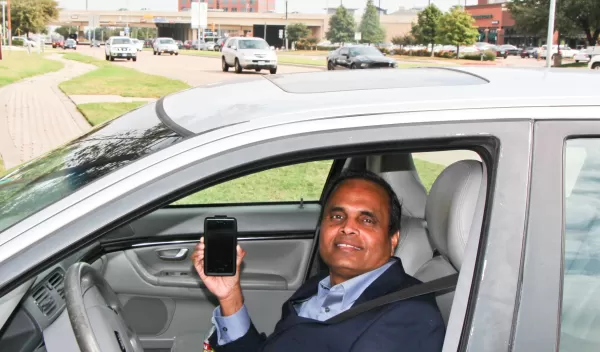
An App to Improve Driving
You are driving along the interstate when your foot depresses the gas pedal. Almost immediately, a disembodied female voice from the smartphone on the center console beside you warns: "Sudden accelerate. Sudden accelerate. Sudden accelerate."
Speeding isn't the only thing that little voice will catch. She won't let you get away with any bad driving practices. You also might hear: "Hard braking," "vehicle wandering detected," "tailgating detected," "lane hopping detected," "bad right (or left) lane change," or "left (or right) swerve detected," among other things. She also will warn you not to talk or text.
Introducing "Mobile Life Guard," a soon-to-be new application for your smartphone that its inventors hope will discourage bad driving, including distracted driving, and keep you and others focused and safe on the roads. It will alert drivers to weather and road conditions--pot holes and speed bumps, for example--and will let drivers know when they are engaging in risky road behaviors.
"After you put the phone on your arm rest and turn it on, it will sense the way you drive--the way you change lanes, the way you brake, the way you make lane changes, tailgating--on all aspects of your driving," says Ram Dantu, a professor of computer science and engineering at the University of North Texas, who developed the artificial intelligence that will enable smartphones to detect weather, road conditions and bad driving using existing sensors in the devices.
Drivers increasingly are using their phones--texting, talking, music, videos--which raises the distraction level and poses new safety challenges on the roads. "We believe mobile phones can help improve road safety by sensing, sharing and providing feedback to drivers," he says.
"I use it every day when I commute one hour from my house to the university," he adds. "The more and more you start hearing it, you will feel that somebody else is telling you when you are driving badly, and you will begin to automatically correct it. The good thing is that no real person is there, so you won't get offended. We believe that if you use it for a month or two, psychologically, you will become trained to become a better driver."
While the technology has the potential to benefit everyone with a driver's license, Dantu predicts that its greatest impact as a safe driving tool will be on young and inexperienced teenagers who are new to driving, and older drivers, whose risk of accidents increases markedly after the age of 65. "This will be reassuring to parents worried about their children's safety, and for the adult children of older people who are worried about mom or dad on the road," Dantu says.
In the fall of 2011, Dantu, an expert in wireless networks and security, was among the first group of scientists to receive a $50,000 National Science Foundation Innovation Corps (I-Corps) award, which supports a set of activities and programs that prepare scientists and engineers to extend their focus beyond the laboratory into the commercial world. The safe driving app is the result of this work.
The aim of I-Corps grants is to translate the results of basic research into technologies with near-term benefits for the economy and society. It is a public-private partnership program that teaches grantees to identify valuable product opportunities that can emerge from academic research, and offers entrepreneurship training to student participants.
Dantu's driving system integrates existing sensors in the phone with new software that can detect various maneuvers by drivers.
"There is a signal processing technique using multiple sensors that picks up what the driver is doing, then we use artificial intelligence to detect different driving patterns on the road," Dantu says. "Based on that, we would classify what kind of event is happening. We are using four or five sensors already in the phone. You won't have to buy anything new for the phone. No add-ons are required. You only will have to download the app."
Moreover, it will be portable, that is, it will work in any car--a rental, for example, or a friend's vehicle.
The app isn't commercially available yet, but it likely will require a fee, as yet undetermined. "We are thinking of either a one-time cost, or a yearly subscription," Dantu says.
Currently, the app is undergoing a field trial with insurance industry backing. If it is successful, users could be eligible for insurance premium safe driver discounts, Dantu says. "Insurance companies see it as an investment in lowering their costs long term," he says.
Dantu, meanwhile, is developing another element for the app, one that will address another skill that long has been the bane of drivers, both new and experienced: parking. "We actually now have a parking module under development," he says. "If you set its parameters correctly, it will help tell you how well you are parking."


